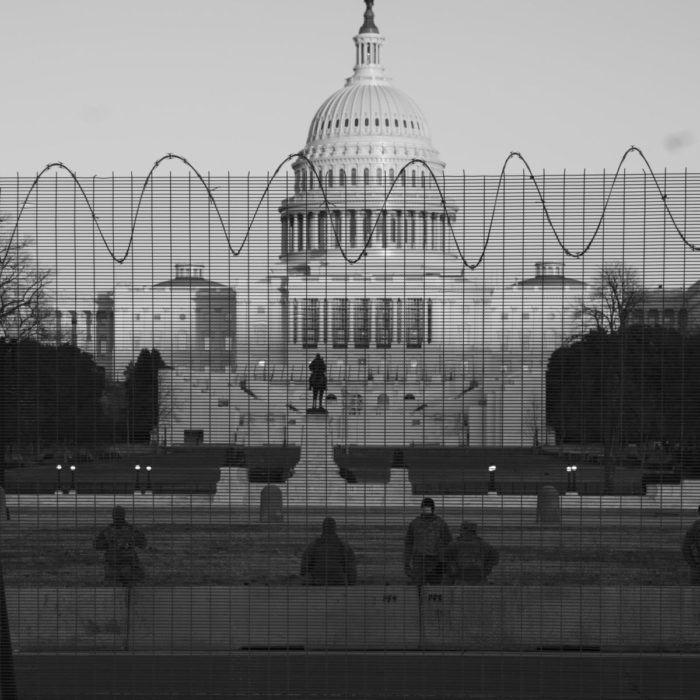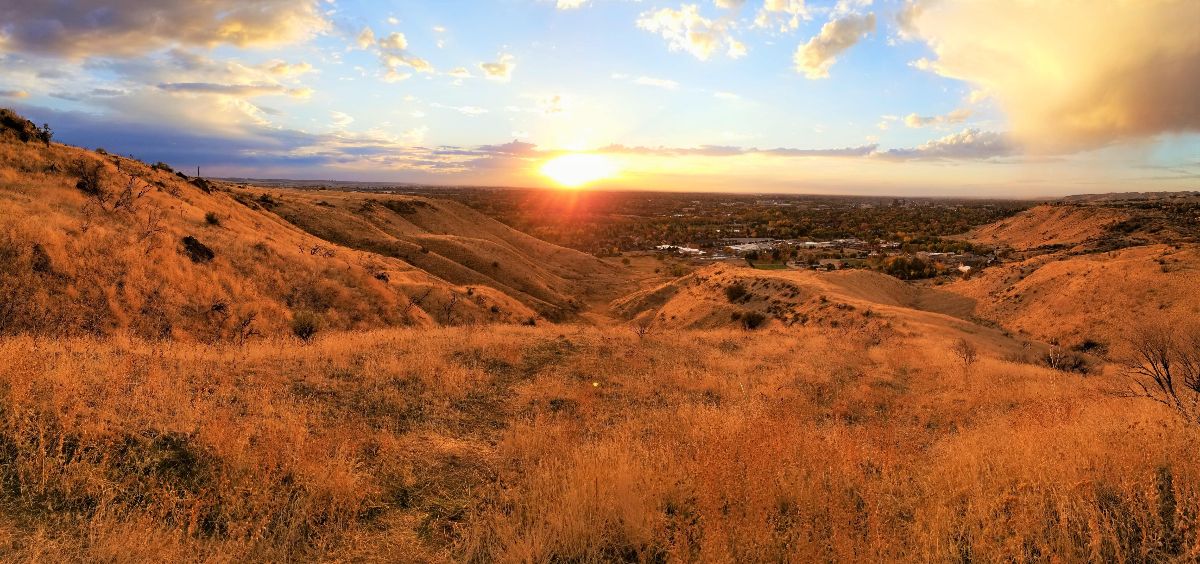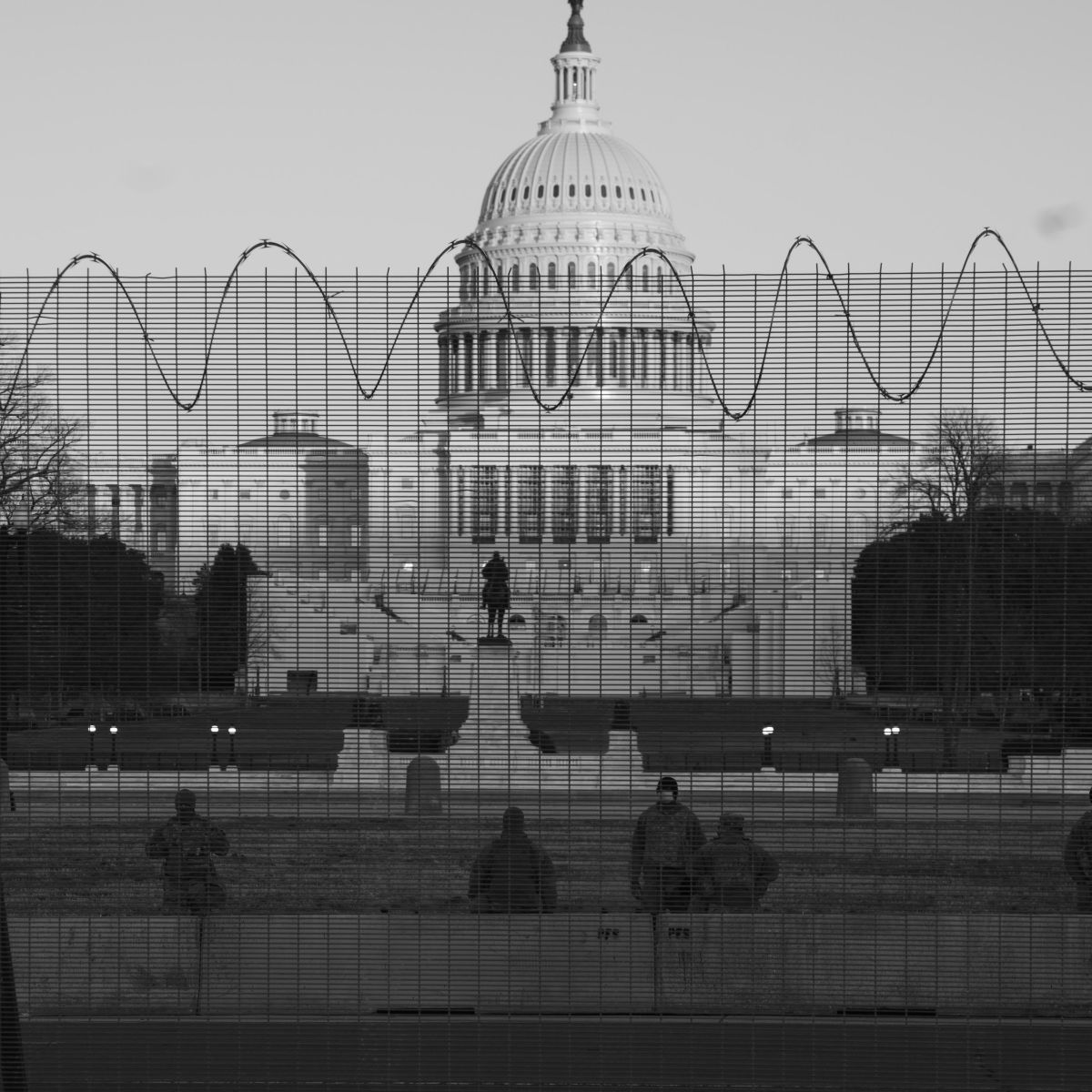
Three weeks after the insurrection in Washington, D.C., it’s clear the event will have lasting ramifications in the West. To prevent similar violence, National Guard troops were deployed to state capitols around the region as legislative sessions began, and on Wednesday, Department of Homeland Security officials said the country faces an increasing threat from “violent domestic extremists.”
Meanwhile, the Western Republicans who voted to impeach former President Donald Trump — Wyoming Representative Liz Cheney, Dan Newhouse and Jaime Herrera Beutler of Washington, and David Valadao of California — are facing blowback from fellow Republicans both in D.C. and their home states. Bending reality, Oregon’s Republican party issued a resolution calling the insurrection a “false flag” operation.
To better understand the dynamics of the riot, its connection with white nationalism, and how federal and state governments alike should respond to the threat of further violence, I caught up with Eric Ward, a senior fellow at the Southern Poverty Law Center and executive director of the Western States Center, a Portland-based civil rights organization. Our conversation has been edited for length and clarity.
This story first appeared in the Bitterroot Newsletter. Sign up below to receive Jake’s latest writing in your inbox.
Jake Bullinger: It’s been three weeks since the insurrection on the Capitol. How has your thinking on the event shifted, if at all, since then?
Eric Ward: Since January 6, what we’re learning is much more horrifying than what we observed initially. It appeared that a hardcore segment of the rally that was organized around the idea of “Stop the Steal” — an allegation of stolen elections that wasn’t true — had just peeled off and somehow were able to push themselves behind unprepared law enforcement, and chaotically rampaged through the Capitol for hours.
What we know now is that organizers of the rally, and perhaps connected to the attempt to breach the capitol, were paid members of the Trump campaign staff. We understand now that some law enforcement officers may have engaged in dereliction of duty. We now know there was an element in that attempted insurrection that was well organized and had missions.
What occurred on January 6 was absolutely horrifying. This country is lucky to have gotten out of it with as little damage as it did. But we should recognize — this is three weeks later, and there is still military stationed in the nation’s capital.
Most of the people who stormed the Capitol were white, and racist symbols and messages were prominent in the crowd. What’s the connection between white supremacy, white nationalism, and what we saw at the Capitol?
I think it’s important to understand that what we saw in D.C. was a gathering of numerous different tendencies and organizations. You had some individuals who simply felt that the elections weren’t fair. They had been told this lie, and they believed that lie. But it also included elements of QAnon, neo-nazis — individuals who were wearing shirts that said ‘Camp Auschwitz.’ There were other white nationalists in the midst, there were paramilitary groups. There were a number of formations, but this coalition known as the alt-right, which we first observed in Charlottesville, Virginia, is primarily driven by individuals who are white naitonalist, or who are willing to partner with white nationalists. The Proud Boys, for instance, claim they are not racist, claim they are not white nationalist, but always seem to have these individuals within their protest ranks who allow white nationalist rhetoric to bubble up. Racism and anti-semitism are part and parcel of white nationalism, and white nationalism is the driving force of the alt-right coalition.
The goal of the events in D.C. on January 6 was the overthrow of American democracy. It’s that simple, and race was the driver. It was not an attempt to debate policy. It was not an attempt to wage disagreements. It was an attempt to disrupt and overthrow American democratic practice. That is an insurrection.
How important is accountability in all this, from prosecutions of those who breached the Capitol to the politicians — including Donald Trump and Arizona representatives Paul Gosar and Andy Biggs — whose rhetoric about a stolen election contributed to the riot?
It’s important to hold people accountable in all of this. That doesn’t necessarily mean criminalization. Again, this wasn’t a mere rally — this was an attempt to overthrow the U.S. government. Now, let’s be clear: not all of those who showed up that day intended to be a part of the insurrection, and that needs to be taken into consideration. But those individuals need to be responsible enough to come forward and share what they know, and what they saw that day. If folks aren’t willing to do that, I do believe the Department of Justice has the duty to pursue criminal charges fully against any individual who can be identified and who has chosen not to come forward.
The reason I bring up prosecution is, you’ve got situations like the Ammon Bundy-led takeover of the Malheur National Wildlife Refuge in 2016 in which it’s clear people broke the law, yet many of them were acquitted. You’ve mentioned in other interviews that those acquittals can embolden similar actions. In that vein, are criminal prosecutions not important?
Look, I’m a person who believes in alternatives to criminalization, and I think that is an important value for this country. I would encourage individuals who were there on January 6 to proactively and responsibly come forward. I would hope that the Department of Justice would show leniency for those who come forward and share what they know and what they participate in. In cases where an individual wasn’t hurt, where there was no serious breach of federal confidentiality — those individuals, I would hope, would only face civil charges at most. I think that’s important when it comes to reconciliation.
But the idea that the DOJ can afford to ignore what occurred on that day doesn’t work. Now look: We understand that there are juries who are influenced by unconscious bias. That results in disparate results in civil and criminal trials, and it’s drawn by race. But that doesn’t mean we abandon the American legal process. It means we put more energy, and better energy, into these legal cases, and we look for other means of redress.
Circling back, does it matter what happens to lawmakers whose rhetoric may have incited the riot?
In ways that it’s proven that it led to loss of life or serious injury of individuals, then absolutely. And I mean that across the political spectrum. If we’re talking about reconciliation, that doesn’t mean me sitting back and waiting for you to ask for forgiveness. Reconciliation calls for deep honesty across the political spectrum. How did we all fail? What mistakes did we make? What rhetoric did we use that was dehumanizing?
So if rhetoric led to death and physical harm, then folks should be held accountable. If rhetoric merely sets the environment, then I think it has to be brought into the open — we need to talk about those things.
I was struck by the number of lawmakers who compared the insurrection to the Black Lives Matter protests. During the impeachment proceedings, some members of Congress argued the summer’s racial justice protests were riots akin to what took place at the Capitol. What do you make of elected officials drawing an equivalence between the two?
I can understand why racial bias drives us to believe that marching for civil rights is the equivalent of attempting to overthrow the government. But it is absolutely no comparison. There was an orchestrated attempt to overthrow the U.S. government. Black Lives Matter is marching to ask law enforcement to stop shooting unarmed Black people. Those are not equivalent mobilizations.
Is property destruction wrong? Yes. Is vandalism wrong? Absolutely. But the rioters took people’s lives; they killed a police officer. That has not happened with Black Lives Matter. Has there been conflict between law enforcement and demonstrators? Absolutely. But in not one of those cases has law enforcement been killed. The comparison is a sign of irresponsibility, and an unwillingness to come to terms with what was unleashed on January 6. As a civil rights leader who keeps his door open to conservatives, it is almost insulting to hear them put forth that type of equivalency.
I’m sorry, but I’m just — you know, the Democratic Party headquarters in Portland has been vandalized multiple times, and I’m sure those weren’t done by folks who see themselves as the political right. We had a museum attacked by folks who don’t see themselves as the political right. And we’ve had minority-owned businesses that have been vandalized.
I am not, in any way, here to defend property destruction. I do not think that’s how democracy works. That’s how mob action works. But neither am I going to draw a comparison between the violence of the far right over these last four years and the rhetoric that gave rise to it by elected officials, and Black Lives Matter marching down the street and folks spray painting. Any elected official that does so is unprincipled and immoral.
The underlying ideologies and conspiracies that provoked the January 6 riot haven’t gone away. What should the federal government and state governments do to ensure more violence doesn’t take place, particularly in the next 12 months?
If we are serious about this, we have to give folks the chance to come forward. That’s a process of reconciliation. What I would do right now is, I would sit with the Department of Justice, I would sit with state attorneys general, and I would say that the first two-thirds of folks who were responsible for the events of January 6 have 30 days to come forward, and we will look for noncriminal remedies. For the other third, they need to understand that the United States of America intends to prosecute them to the full extent of the law. It can’t stand.
The second piece, it’s time for a fairness doctrine for radio and television news. That’s not just for conservative media — that’s for liberals, too. It’s time for journalism to be what it was created to do. I think too much editorializing, and a push for profits, has sullied it.
The third piece is a de-radicalization program in civil society, primarily civil servants. White nationalists have too much sympathy within our structures of government right now. We saw it in terms of law enforcement not taking the threat seriously. We’ve seen it in law enforcement’s bias in crowd-control policing between counter-demonstrators and the alt-right. It’s time to contend with de-radicalization within government.
And the last thing — we can’t treat every white person in America as if they’re a white nationalist. The majority aren’t. And we have to fortify white communities in being able to resist white nationalist intimidation and white nationalist organizing.
So how serious is the threat of more violence in the coming months and years?
I know we’ve been focused on paramilitaries, and we need to continue focusing on that. But I think that we’re going to see the rise of another threat more akin to terror cells that engage in bombings and assassinations of elected officials and human rights activists. I think the pipe bombs placed at the RNC and DNC — I think we’re more likely to see waves of terror like that.
And then at the state level, it will be these armed paramilitaries that have never been held to account. And that becomes a much dicier proposition, because these groups have been allowed a lot of space and oxygen for a long, long time. They see no need to seek the common good with the rest of the citizens in the states they reside in. So some real work and thinking has to go into what to do with these armed paramilitaries.
But look, we don’t make peace with our friends. We make peace with our enemies. We have to strive, where we can, to find where our values bring us together to seek the common good and common ground. In those places where it doesn’t exist, and they seek to use harassment or violence to circumvent democratic practice, they need to be held accountable by our republic.
Striving to seek common ground — I’ve gotta admit, I was likelier to use language like that a month ago than I am now. There is a not-insignificant segment of the population that disagrees on fundamental things like facts, views on what America should be, how a republic should function. Convince me that seeking common ground is worthwhile.
There was a time in our country when folks thought of Black people as nothing more than chattel. And it wasn’t a small portion of our population. We have made some progress, I would argue, against that. We haven’t completely departed the legacies of white supremacy in our communities, but we have shifted.
I’m not saying it’s easy, and it’s not clear to me that this all ends well. It is clear to me that, if we don’t try, where this goes is a place of political nightmares. I would hope that, at the very least, January 6 gave us a small inkling of that. It is time to step up. This is going to be very hard, and we’ve made it very hard on ourselves. We shouldn’t make it any harder.
This is the time to write down the name and email address of every elected official who represents you. It doesn’t matter if it’s a school board member or the president of the United States, you need to send an email to each individual telling them to take white nationalism and its threat to democracy very seriously, and to prioritize a response that is not simply dependent on the criminalization of white nationalism, but seeks to respond to it with a comprehensive plan. The answer to this is not throwing everyone in jail.
Bitterroot thrives with reader support
Worth a Read
Top stories from around the West
Privilege is shaping the COVID-19 vaccine rollout. In Los Angeles, essential workers in communities of color are getting vaccinated at lower rates than in white neighborhoods. Meanwhile, donors to a Seattle-area hospital got to skip ahead in the vaccine line.
•••
It’s a temporary measure, and it doesn’t halt any active drilling. But President Joe Biden’s moratorium on oil-and-gas leases on federal land is among the most prominent environmental actions to ever come from the White House. It will have an outsize impact on energy-dependent states with a lot of public land, such as Wyoming and New Mexico.
•••
Lawmakers across the region — in Montana, Utah, and Idaho, among others — are introducing bills that would limit governors’ authority to issue emergency declarations during crises like the coronavirus pandemic.
•••
Ugh. Bruce Finley of The Denver Post explains why everything, from climate to politics, is priming Western forests for more severe wildfires.
•••
Is Mitt Romney the most influential Republican in Congress? The Salt Lake Tribune’s Lee Davidson dives in.
•••
This New Yorker documentary highlights the hardworking folks at the Navajo Times, who are chronicling the Navajo Nation’s COVID-19 outbreak while grappling with the economic woes facing newspapers in many rural communities.
Like Bitterroot? Spread the word.
Your Land
An ode to the public lands we share

Share with a friend | Watch a cat video | View previous newsletters

